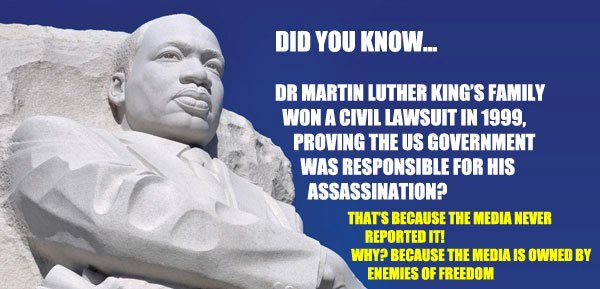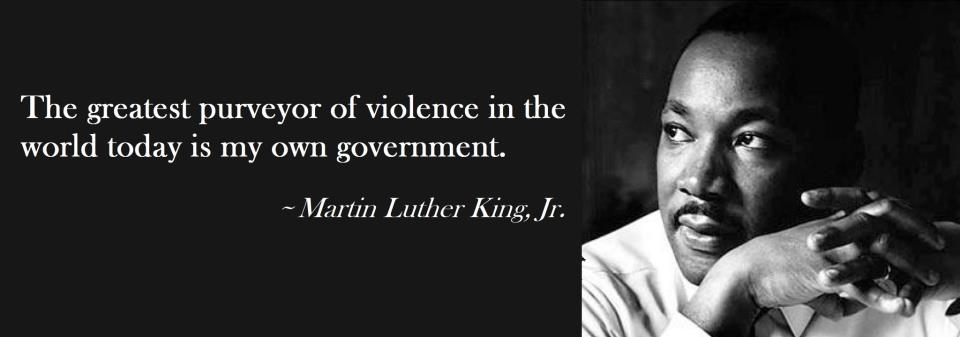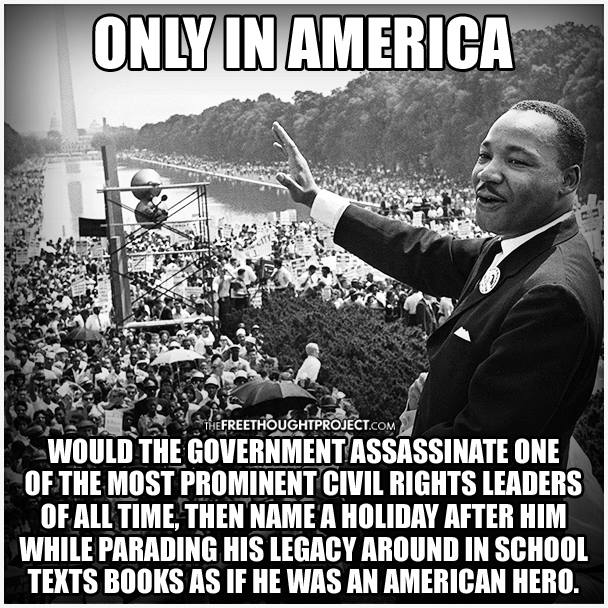
Martin Luther King
Assassinations
See: COINTELPRO CHAOS
[2011 Jan] Martin Luther King assassinated by US government: MLK civil trial decision
The Execution of Martin Luther King.
Book
[2008] An
Act of State, the execution of Martin Luther King
by William F. Pepper

Quotes
Well, he was just about the top of the list in terms of J. Edgar Hoover for
reasons that are still unclear. Many books have been written about J. Edgar
Hoover, and I don't think anybody quite understands what made him tick. He hated
Dr. King. He made no bones about it. I mean, he would -- he would send letters
using -- referring to him as garbage, referring to him as slime. When Martin
Luther King was awarded the Nobel Peace Prize, he wrote a long diatribe about
how that was the most ridiculous thing he ever heard of in his life, and in fact
started a whole thing to disrupt the Nobel Peace Prize program. But he and the
SCLC, as Dr. King's organization, were by themselves a major target of the FBI
from early on. He certainly was being investigated in the 50's. It wasn't until
the early 60's that it really intensified.
A. Sure. The first really significant ones were -- were to -- to suggest that
the Southern Christian Leadership Conference was communist infiltrated and
communist dominated. They -- the FBI had prepared dossiers on King and on
everybody who was working with him and had two people who were close to Dr. King
who had at some time in the past had some affiliations with communists.
You should understand, because this came out later, they had no evidence
whatsoever that either of these two people was at that time a communists or that
either of these two people was trying to impose some communist line on Dr. King,
but they decided to say that anyway.
And they prepared dossiers on these two -- one was a white lawyer, Stanley
Levinson, the other was a black organizer named Jack O'Dell. And what they did
is they -- the same way, get us a friend at this paper, get us a friend there.
They started planting stories.[1999]
Testimony of Mr. William Schaap on the role of
the U.S. Government in the assassination of Martin Luther King
Well, the first real escalation was in sixty -- in late '64 when I mentioned
before that Hoover gave a press conference and called King the most notorious
liar in the country. This was sort of a -- it was shocking that he said it, it
was shocking that he said it in the context of a public meeting with
journalists. And it appeared all over the country. And the whole conference was
reprinted in U.S. News and World Report with a short response from -- from Dr.
King.
That was the start of -- of a
campaign which continued right up until -- until King's death. I mentioned
before that during the Nobel Peace Prize period of time this was in -- the
nomination was in late '64, and he received it in January of '65. Hoover had the
FBI do everything they could to minimize -- he couldn't stop the Swedish and
Norwegian governments from giving him the prize. But he did everything that he
could to try to stop it from being honored here.
There was a major banquet in Dr.
King's honor in Atlanta when he came back from receiving the prize. Hoover got
the editor of the Atlanta Constitution personally to go around and try and
persuade various people not to attend the banquet. There were also a series of
articles around this time trying to show that -- that King was being influenced
by communists which were being -- again, we learned this from reports.
The FBI, as the CIA, was actually
writing the articles anonymously and then trying to get their friends in papers
to print the article under somebody else's name. And there were a whole series,
some of which actually did get printed, some of which didn't. There were also --
I won't go -- I mean, there are big -- hundreds and hundreds of pages of reports
detailing all the things that the FBI did.
They -- one of the most outrageous
was a doctored tape recording that was prepared that purported to -- to be a
recording of Dr. King engaging in raucous and possibly sexual activities with
various people. It turned out to be -- most of it was totally fraudulent. And
what wasn't fraudulent did not have to do with anything torrid going on. It was
all put together. And the tape -- in fact, the tape was originally used -- and
this is one of the things that the House Committee found the most outrageous --
in an attempt to try and drive Dr. King to commit suicide.
Shortly before he went to get the
Nobel Prize, the tape was mailed to him with a long letter basically saying, if
you don't kill yourself, we're going to make this public. Nothing ever happened
because he was getting so much mail that this thing that somebody thought was --
somebody made a tape of one of his speeches. And they put it in the back room,
and they didn't get to look at it until about nine months later, long after he
had come back.
And then they saw the note trying
to get him to commit suicide. And then, ten years later, we discover that it was
the FBI who wrote that note and made that tape and mailed it to Dr. King.
[1999] Testimony of Mr. William
Schaap on the role of the U.S. Government in the
assassination of Martin Luther King
Well, for one thing, the attempts to discredit Dr. King -- particularly the
FBI attempts -- did not stop after his death. They continued to send out their
little dossiers and reports and phony information to try and discredit his
memory. They also -- in the beginning when, of course, the assassin had not yet
been caught or, rather, no one yet had been caught and charged with the
assassination, had to give the impression that the FBI was doing a great job.
I mean, one of the criticisms that
was unavoidable is when Hoover had already publicly attacked Dr. King in all
these magazines and said he thought he was a liar and thought he was the worst
problem facing the United States and so on, it became a problem for the FBI then
to try and convince America that they were doing everything in their power to
apprehend his killer. And to do that, they had to pull out all the stops and get
all their friendly columnists writing story after story that they were doing
everything they could. And also subsequently to try and add to the stories that
they were convinced [1999]
Testimony of Mr. William Schaap on the role of the
U.S. Government in the assassination of Martin Luther King
Not only enhance, but use hyperbole that was pretty bizarre. Although, of
course, you can understand the pressures that were on them when no one had been
caught. Drew Pearson, who was a very close friend of Hoover's, had a nationally
syndicated column and wrote one basically designed to try and kill the rumors
that Hoover wasn't trying hard because he didn't like King.
And in it Pearson says he is convinced that the FBI is conducting perhaps the
most painstaking exhaustive manhunt ever before undertaken in the United States.
Why -- how he would know is beyond us, but that's clearly what Hoover told him
to say. They also -- I don't have the clipping here. But they also had another
one of their very close operatives, Jeremiah O'Leary, who was then with the
Washington Star, did an article for the Reader's Digest. And he went one beyond
Pearson and said it was the greatest manhunt in law enforcement history in the
world. So he was now saying this wasn't only the greatest manhunt in America, it
was the greatest manhunt ever, anywhere.
There were -- there are a whole --
and, of course, when Ray was arrested, then there was a state of sort of
self-congratulatory columns done by the same friends of the FBI showing what a
wonderful job they had done. [1999]
Testimony of Mr. William Schaap on the role of
the U.S. Government in the assassination of Martin Luther King
Well, there certainly are in my opinion. At this point, once we get beyond the things that have been admitted in the Congressional Reports, I'm drawing my conclusions based on my own experience and expertise. But it certainly seems clear that there were media operations around -- not only that the FBI had done a wonderful job, but also on the -- the campaign to demonstrate that -- not only that James Earl Ray had done it, but that he had acted alone. [1999] Testimony of Mr. William Schaap on the role of the U.S. Government in the assassination of Martin Luther King
Well, there -- you see in stories, again by friends of the FBI, statements
like: It looks like the theory that there was a conspiracy is untrue. The FBI
has exploded the theory that there was a conspiracy. The -- even people who had
-- see, they -- they got caught a little bit because in the beginning they were
planting stories that had conspiracy -- I mean, there was a story that the FBI
planted at the very beginning saying that Dr. King had been killed by the
husband -- by an irate husband of a lover of his.
Now, later -- ten years later we
saw that this was invented and that they had made up this story. But then they
were sort of stuck. Because if you're saying that Ray was hired by somebody else
to do it, that's a conspiracy. So then they had to drop that story because now
the line was there was no conspiracy. Now they're saying -- and the same people.
Pearson mentioned that story and then later on denounced the generally prevalent
theory that the murder involved a conspiracy without pointing out that he was
one of the people who were part of the original prevalent theory.
Even -- particularly, actually, after the guilty plea, when it got -- there was
no longer a judicial proceeding going on about which they could feed the stories
they wanted to, they still felt a compulsion to periodically come up with
stories that there was no conspiracy, there was no plot. This one on the screen
being another one of these -- these examples.
[1999] Testimony of Mr. William Schaap
on the role of the U.S. Government in the assassination of Martin Luther
King
But in the first year after the plea of guilty, Anderson wrote a number of
columns saying there just wasn't any conspiracy. Max Lerner wrote columns saying
Ray was the killer, there's nothing to the conspiracy theory. And when --
another example of how they -- they fuzzied it was even at the time of the plea,
there was a story on the -- in the Washington Post, which I think I've given you
a copy of, where they said: No evidence of any plot, Jury is told.
Now that isn't really what the Jury
was told. But if you read the story, it was that the prosecution was not
presenting any evidence of a plot, which is very different from saying -- of
course, they didn't present any evidence that there wasn't a plot either. Yet if
you look at that headline, it looks like something has been said and done in
court showing a jury there was no -- no plot. And that's not what happened. It
wasn't -- it wasn't discussed either way.
And they -- they -- there was a story I believe the next week in the Washington
Post where the title of the story was: "Ray Alone Still Talks of a Plot." Which,
again, journalistically was ridiculous. Because there were millions upon
millions of Americans talking about whether there was a plot. And a story which,
you know, tries to create the impression that James Earl Ray was stark raving
mad and was the only person in America who thought there might have been a plot.
That campaign went -- and, in fact,
they then said, well, what we really meant was that he's the only person who is
officially involved in the proceedings and thinks there's a plot, everyone else
doesn't. And even that wasn't true because the next day there was a story in the
papers that the -- the judge here -- the judge at the time, Judge Battle, wasn't
sure and thought maybe there had been a plot and certainly made it clear that
under Tennessee law if further -- if co-conspirators came up or were arrested or
indicted, they would be subject to -- to trial.
[1999] Testimony of Mr. William Schaap
on the role of the U.S. Government in the assassination of Martin Luther
King

